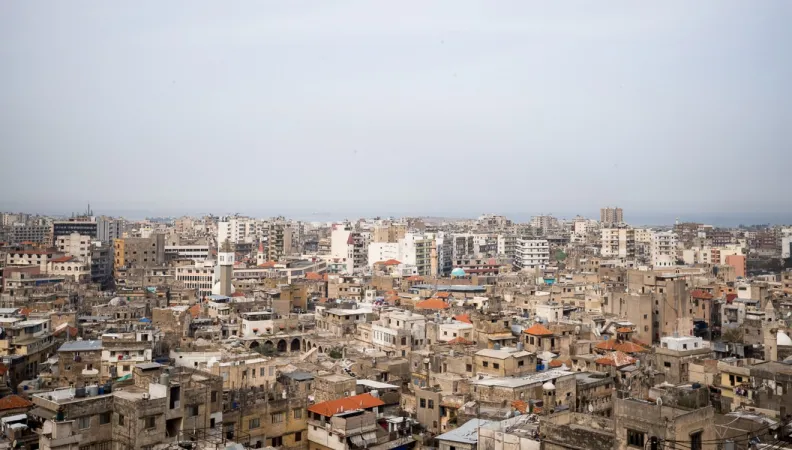Share the page
To Overcome Multiple Crises, Lebanese Localities Team up with French Region
Published on

In an ambitious gesture of solidarity, France’s Pays de la Loire region in the west of the country is participating in a series of development projects some 4,500 kilometers away, in Lebanon. Collaborating with Lebanese localities, the French region is investing in projects linked to Lebanon’s environment, its water and sanitation, energy transition, air quality, and waste management.
Lebanon has lurched from one crisis to another, from the financial crisis in 2019 and the massive explosions that rocked Beirut in 2020, to the deepening economic crisis that is exacerbating poverty and food insecurity across the country. Yet all the while, the country continues to host millions of Syrian refugees – the largest per capita proportion in the world.
Much of this work is carried out by Lebanese localities, and at their side is the French Local Authorities Financing Facility (FICOL), established by AFD to finance decentralized cooperation projects piloted by French local and regional authorities.
Sharing expertise
Through FICOL, the Pays de la Loire, a region in the west of France, worked with a number of localities in Lebanon from September 2019 to December 2022.
“The region expressed its desire to mobilize our local skills in support of Lebanon, and this project made it happen,” said Sophie Marion-Maanni, International Project Manager at the Pays de la Loire Regional Council.
The Loire region called on the expertise of its technical directors to provide training, and invited other regional stakeholders from both the private and public sectors to participate. From September 2019, the region worked with the Technical Office of Lebanese Municipalities (BTVL) to set up a hub for the sharing and honing of skills and expertise.
The projects launched tackle the environment, water and sanitation, the energy transition, air quality, and waste management. Among those trained were elected officials, police officers, civil servants, and volunteers from some 40 localities from a cross-section of Lebanese society. Out of 40 localities that received training, 12 later received in-depth guidance to form “environmental units,” whose aim is to take action for the environment.
All about FICOL: a springboard for French local authorities to support projects in developing countries
It was by no means a one-way exchange: “These exchanges between Lebanese engineers and engineers from our region were beneficial for everyone,” says Sophie Marion-Maanni. “For example, our region discovered cutting-edge know-how in preventing water pollution on coastlines and dealt with waste management in coastal areas. We also brought new solutions back from Lebanon, such as photovoltaic tiles.”
In Lebanon, each environmental unit had to identify a critical facility that was missing or that needed priority upgrading. The units assessed vital needs and shortages in the wake of the country’s continuing social and economic crises. Once the facility was determined, the partners carried out a feasibility study.
Biomass briquettes instead of fuel oil
For the Lebanese town of El Qaa, the direct cooperation between local authorities may turn out to be a game changer. Located 15 km from the Syrian border, the small town of 15,000 hosts 30,000 refugees. “Our town currently heats with nearly 8,000 oil stoves; we have to find 600 liters of fuel every three months,” says the mayor, Bachir Matar. “It’s very expensive, very polluting, and there are smuggling problems with Syria.”
For the mayor, the project was an opportunity to force changes despite the war, the Covid-19 crisis, and other obstacles. “Our agricultural factories can be converted into production lines for biomass briquettes, which could be a solution both to agricultural waste treatment and to heating needs,” he says.
In addition, long-term relationships are being forged beyond the framework of the project. “We prefer to work with a local government: it has many advantages, and we understand each other,” says Bachir Matar. He is now planning increased cultural exchanges, the setting up of a sister-city project, and maybe even future growth in interest in El Qaa as a tourist site.
Back in Pays de la Loire, Trivalis, the local authority for waste treatment also wants to continue discussions with the towns of El Qaa and Araya (in the Mount Lebanon region). The three local authorities are also studying their own cooperation project, likewise funded by an AFD FICOL project.
See also: Two localities from Niger and France join together for access to drinking water
Raising awareness about international citizenship among young people
Now that the Pays de la Loire Region has established close ties with Lebanon through this adventure, it’s capitalizing on that experience to raise awareness about international citizenship in its local schools. Students and teachers closely studied the problems specific to Lebanon, and—despite the constraints caused by Covid—created a virtual exhibit on their online museum, produced by the Pays de la Loire International Cooperation network. “We carried out a project that’s concrete, beneficial, and sustainable,” concludes Sophie Marion-Maanni.
The success of this operation is illustrative of AFD’s conviction that one way to help achieve the SDGs is to promote local authorities that build mutual relationships in which they can share and enrich their local public policies and practices.
Through FICOL, the region met its objective of supporting Lebanon via the Operational Support to Lebanese Municipalities in the Field of Environment (SOCLE) project. The initiative also helps fulfill the UN’s Sustainable Development Goals (SDGs) as well as France’s development and international solidarity policy.
